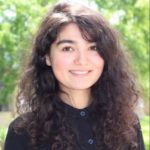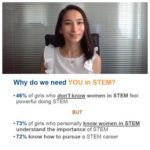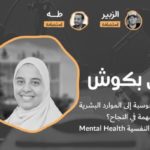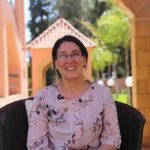Impact Stories from Youth Engagement Policy Area

USALTech hosts the TechWomen/TechGirls Gathering
Fellow(s): Nisreen Deeb, Ghana Bteich, Lara Chikhani, Rasha Sukkarieh
Country: Lebanon
Cohort: 2013, 2015, 2017
Policy Area(s): Economic Impact, Education Diplomacy/Mentoring, Empowering Women and Girls, Entrepreneurship, Professional Growth, Youth Engagement
TechWomen and TechGirls alumnae hosted the TechWomen/TechGirls Gathering, a networking event that connected alumnae and invited local women and girls in technology to learn about the two programs. The gathering was organized by U.S. Alumnae for Lebanese TechWomen and TechGirls (USALTech), a club and online platform founded by fellows Nisreen Deeb (2013), Ghana Bteich (2015) and 2017 fellows Lara Chikhani and Rasha Sukkarieh, alongside TechGirls alumnae. With support from Legacy International, USALTech connects Lebanese exchange program alumnae, promotes opportunities for women and girls in STEM and encourages its members to share their skills and expertise.
The event, attended by the public affairs officer and cultural affairs officer at the U.S. Embassy Beirut, introduced both the TechWomen and TechGirls programs to potential applicants, and invited each attendee to introduce herself and share her professional interests. “Instant connections were made,” said Nisreen. “Many ladies shared the same career paths. Some TechWomen were able to help many TechGirls on the spot.” After, the alumnae hosted a Q&A for both programs, answering questions about the applications and sharing their exchange experiences. Many of the women and girls also spoke about the challenges they face in Lebanon, and the group agreed to continue the conversation and help one another moving forward. “New connections and new bridges for support were made,” said Nisreen.
Report Date...: 12/29/2021

Fellows speak about EdTech at YALI Connect
Fellow(s): Horore Bebga, Angele Messa
Country: Cameroon
Cohort: 2018, 2019
Policy Area(s): Economic Impact, Education Diplomacy/Mentoring, Empowering Women and Girls, Entrepreneurship, Professional Growth, Youth Engagement
This month, 2018 fellow Horore Bebga and 2019 fellow Angele Messa were featured speakers at YALI Connect, a monthly event from the Young African Leaders Initiative (YALI), an initiative from the U.S. Department of State that educates and connects the next generation of African leaders. The event, themed on education, was hosted by the YALI Regional Leadership Center in Dakar, Senegal, a space that offers training to young leaders from 16 African countries. Horore and Angele are both YALI alumnae. Angele is the founder of EduClick, an EdTech platform that offers alternative learning methods for those who don’t have access to formal education in Cameroon. Horore is the co-founder of Likalo Education, a STEM education initiative that empowers young people with 21st century skills. Likalo’s newest platform, Cyber Muna, offers media and online safety education for children and educational institutions. At the event, Horore and Angele shared their experiences and challenges working in education and answered questions from YALI alumnae about women in EdTech. “Horore and I unanimously believe African women have their part to play in education in general,” said Angele. “We don’t only believe they have a part to play, we believe they are the main players in the field.”
Read More »Report Date...: 12/29/2021

Fellow highlighted in CNN feature for empowering women
Fellow(s): Durdona Bakhronova
Country: Uzbekistan
Cohort: 2020-2021
Policy Area(s): Education Diplomacy/Mentoring, Empowering Women and Girls, Professional Growth, Youth Engagement
2020-2021 fellow Durdona Bakhronova was featured in a story on CNN, highlighted for her work mentoring women and youth in IT. In the interview, This woman wants more female coders in Uzbekistan, Durdona spoke about starting her career in coding without role models: “There were so few female representatives,” she said. “I decided to change that.”
Durdona works as a frontend developer for Super Dispatch, and is committed to empowering women and young people in Tashkent to pursue STEM fields. As a mentor, she encourages women to create products for their communities from the female perspective: “So many men try to build a product for everybody, but half of the population is women,” she said. Through her advocacy, Durdona hopes to communicate that anyone can be a mentor and role model: “What I do is contribute to the community in the form of meetups, developer festivals, etc. Other than that, I’m just a simple software engineer who just wants more women in IT.”
Report Date...: 12/29/2021

Fellow wins Women in STEM Champion Award
Fellow(s): Josephine Ndambuki
Country: Kenya
Cohort: 2013
Policy Area(s): Economic Impact, Education Diplomacy/Mentoring, Empowering Women and Girls, Entrepreneurship, Professional Growth, Youth Engagement
Last month, 2013 fellow of Kenya Josephine Ndambuki was named winner of the Women on Boards Network’s Women in STEM Champion Award, recognized for her STEM advocacy and leadership for women and girls in Kenya. The Women on Boards Network (WOBN) works to address the gender gap within corporate boards through supporting and promoting women leaders. This year’s inaugural WOBN Awards brought together women leaders in Kenya to celebrate gender parity on boards and honor those who have made significant contributions to gender diversity.
Josephine is the manager of economic development, partnerships and resource mobilization for Konza Technopolis, a mixed-use city and innovation hub that is a flagship program of Kenya’s Vision 2030 economic development portfolio. She is also the founder of DigitzeHer, an initiative that trains women and girls with digital skills. Last year, Josephine wrote a guest blog for TechWomen about her journey to Konza Technopolis, reflecting on her TechWomen experience that served as a catalyst for her personal and professional development.
The Women in STEM Champion Award recognizes a woman that has advocated for women in STEM fields, serving as a role model for women and girls in Kenya. “I take this with a lot of humility and dedicate this to the many women in STEM, HeForShe mentors and advocates, role models and organizations that I have had an opportunity to work with in this journey,” wrote Josephine. “We cannot afford to have a gender divide in the digital divide.”
Report Date...: 12/6/21

In presentation fellow tells girls they are needed in STEM fields
Fellow(s): Sitora Salaeva
Country: Uzbekistan
Cohort: 2019
Policy Area(s): Education Diplomacy/Mentoring, Empowering Women and Girls, Professional Growth, Youth Engagement
2019 fellow Sitora Salaeva was a featured speaker at STEM Week, an online training program for girls led by 2021 TechGirls alumna Diyora Daminova. In partnership with the Academic Lyceum of Westminster at the International University in Tashkent (ALWIUT), STEM Week brought leadership development, resources and inspiring talks from women in STEM in Uzbekistan.
Sitora, who served on the planning committee for the inaugural 2020 Uzbekistan TechWomen/TechGirls Alumnae Summit, works as a software development engineer for the Bureau of Enforcement under the General Prosecutor’s Office of Uzbekistan. Currently, she is pursuing her second master’s degree in cybersecurity in the UK. In her STEM Week presentation, Sitora spoke about choosing a career in STEM and why girls and women play a key role in STEM progress. “I shared innovative projects that failed until women were involved, because women can offer a different perspective on problem-solving,” she said. Through sharing the legacies of STEM pioneers like Ada Lovelace and Grace Hopper, Sitora hoped to show the girls that they, too, can be contributors and leaders in STEM fields. “You can invent new things, you can help grow your country’s economy and you can help empower other girls to enter STEM,” she said. At the Q&A after her presentation, attendees had an opportunity to ask Sitora about the achievements she is the proudest of, who inspired her to enter STEM and ways they could pursue STEM through academics, extracurricular activities and international exchange programs like TechGirls and TechWomen.
Report Date...: 11/29/21

Fellow and TechGirls alumna collaborate to inspire girls in STEM
Fellow(s): Imene Henni Mansour
Country: Algeria
Cohort: 2019
Policy Area(s): Education Diplomacy/Mentoring, Empowering Women and Girls, Entrepreneurship, Professional Growth, Youth Engagement
This week, 2019 fellow Imene Henni Mansour was a guest speaker at Women Who STEM, a free online initiative that empowers women and girls to pursue STEM fields. Women Who STEM was founded by Youssra Bencherif, a 2021 TechGirls alumna from Algeria.
Imene and Youssra met during Youssra’s TechGirls 2021 interview, where Imene served on the interview panel. Youssra reached out to Imene shortly after the 2021 program concluded, asking her to get involved in her initiative. At the most recent event, Youssra invited women leaders to share their careers in STEM and give advice to girls on how to kickstart their STEM careers. In her talk, Imene, the CEO of InnoCom, spoke about computer science, entrepreneurship in Algeria and how volunteering helped her gain the soft skills required to create her own company. Imene told the girls that they must challenge themselves every day to be the best version of themselves: “As women entrepreneurs, we have to be bold and self-confident, because others can feel it,” she said. “I also advised them to always be self-learners, whatever their age, position or status.”
Report Date...: 11/29/21

Fellow speaks about climate action at UN COP 26
Fellow(s): Rim Assaad
Country: Lebanon
Cohort: 2018
Policy Area(s): Economic Impact, Education Diplomacy/Mentoring, Empowering Women and Girls, Entrepreneurship, Environmental Sustainability, Professional Growth, Youth Engagement
This month, 2018 fellow Rim Assaad was invited to attend the United Nations Climate Change Conference (COP 26) in Glasgow, United Kingdom, speaking on two panels about climate action in Lebanon. The annual summit convened world leaders, businesses and citizens for twelve days of talks themed on the Paris Agreement goals and the UN Framework Convention on Climate Change. Rim is the co-founder of RISE2030, a community-led initiative managed by Sustain The World Org and Sustainable Empowerment for Youth International. Through their education and training programs – which include solar installation, literacy training and support for women farmers –RISE2030 aims to mobilize women and youth to create sustainable communities and contribute to Lebanon’s energy transition. In 2021, RISE2030 distributed 46,000 meals and created over 2,000 jobs.
Last year, RISE2030 won a United Nations Global Climate Action Award in the “Women for Results” category. After delays caused by the COVID-19 pandemic, Rim represented RISE2030 at COP 26 as a featured guest and panelist, sharing her work addressing challenges in Lebanon. In her panel, Advancing Gender Equity in Climate Action, Rim spoke about Lebanon’s current energy crisis that was exacerbated by COVID-19 and the 2020 Beirut explosion. She said that RISE2030 aims to be a part of the solution, working to train and mobilize all-women teams to address power grid issues. “Creating all-women teams is a bold statement,” Rim said. “Being a woman in Lebanon has never been harder, yet women are proving to be leaders of change.”
Report Date...: 11/8/21

In USG Alumni Talk fellow discusses STEM education for girls
Fellow(s): Elena Selezneva
Country: Uzbekistan
Cohort: 2016
Policy Area(s): Economic Impact, Education Diplomacy/Mentoring, Empowering Women and Girls, Entrepreneurship, Professional Growth, Youth Engagement
Last week, 2016 fellow Elena Selezneva was invited by American Spaces in Uzbekistan Tashkent to discuss STEM programs for girls and her TechWomen experience. The conversation was part of the American Space USG Alumni Talks series that spotlights alumnae from exchange programs, inviting them to share their expertise and exchange program experience.
Elena and 2016 fellow Saida Yusupova are the founders of Tech4Impact, an initiative that nurtures IT, innovation, green tech and women’s entrepreneurship in Uzbekistan and Central Asia. Their recent project, Accelerating Women’s Climate Change Tech Startups in Uzbekistan, trains and supports women in the Karakalpakstan region of Uzbekistan, helping them establish businesses and initiatives that address the social and economic effects of climate change. Elena also brought the Technovation Challenge to Uzbekistan in 2016, and currently serves as their regional ambassador. Elena began her talk with an overview of TechWomen, emphasizing that the program not only improved her skills but also led to long-lasting friendships and professional collaborations that empower women and girls in STEM. After sharing data on the underrepresentation of women and girls in STEM in Uzbekistan, Elena amplified programs working to close the gap, including Tech4Impact’s UNISAT nanosatellite program that will train 150 girls to design, program, assemble and launch nanosatellites. “You may hear that STEM is not for girls, but it’s not true. There are many brilliant women and girls working in ICT, in IT, in engineering and in science,” she said.
Report Date...: 11/1/21

Fellow speaks about career and TechWomen on podcast
Fellow(s): Salma Bekkouche
Country: Algeria
Cohort: 2018
Policy Area(s): Education Diplomacy/Mentoring, Empowering Women and Girls, Professional Growth, Youth Engagement
This week 2018 fellow Salma Bekkouche was a featured guest on the Gusra podcast, a show that invites thought leaders in the MENA region to speak about their career journeys, experiences and passions. Salma is a recruiter and blogger whose platform, Salma Share, aims to empower Algerian youth through offering best practices and career advice. Her website and YouTube channel offer tips on applying to international programs abroad and invites guest bloggers to share their international education experiences.
In the podcast interview, Salma spoke about the value of volunteering with local clubs and organizations, sharing that her experience with Algeria’s TechWomen/TechGirls Club helped her transition from IT to HR. She reflected on her TechWomen mentorship at Twitter, where she learned the importance of personal branding on social media: “I had the chance to connect with experts from around the world in one place,” she said.
Report Date...: 11/1/21

At Girls STEAM Camp fellow shares advice and inspiration
Fellow(s): Houda Chakiri
Country: Morocco
Cohort: 2012
Policy Area(s): Education Diplomacy/Mentoring, Empowering Women and Girls, Professional Growth, Youth Engagement
2012 fellow Houda Chakiri spoke to over 100 secondary school students in Morocco, Côte d’Ivoire and the United States at last month’s WiSci Morocco Girls STEAM Camp, a two-week virtual program that offered girls interactive STEM workshops, leadership training and mentorship opportunities. Houda, an assistant professor of computer science, was joined by other international women leaders for the Women In STEAM panel, sharing their diverse experiences as women in leadership.
During the panel, the moderator encouraged the panelists to remember their experiences when they were the same age as the girls. Houda offered her perspective, sharing the barriers she faced as a girl and emphasizing that girls continue to face challenges when pursuing STEM fields. She reminded the girls, however, that setbacks can serve as fuel for achievement: “Don’t be afraid of failure – it can be a real push to strive for success,” she said.
Report Date...: 10/25/21

